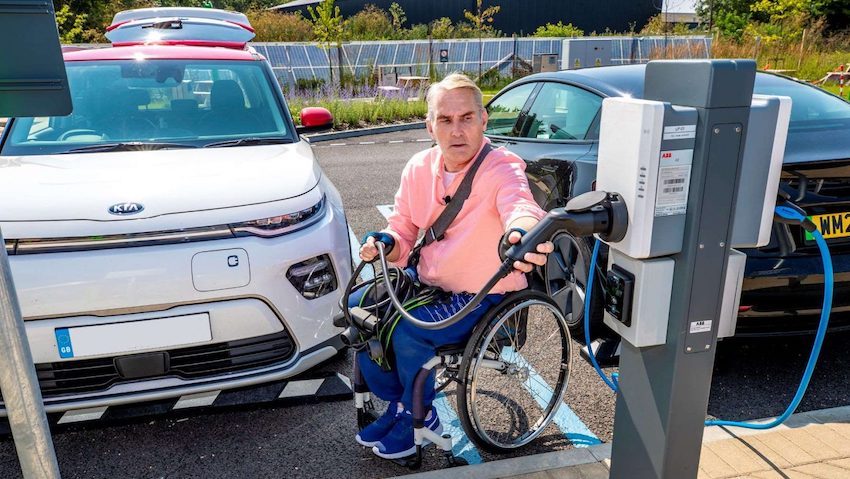Study finds public EV chargers are “failing” disabled drivers
Research from Motability and Designability has found that public charging solutions are “failing” disabled drivers of electric vehicles.
National disability charities Motability and Designability have published findings from the user engagement phase of an accessibility project to make electric vehicle charging infrastructure in the UK accessible to disabled people.
The two charities worked together to gain an insight from disabled people regarding the challenges that come with operating public electric vehicle chargepoints. The report sought experiences and views from disabled people who currently use EVs, and those who have not yet made the transition, as well as their carers, drivers and passengers.
The study saw various responses which included: “I did want an EV this time round, but the lack of accessibility of charging and the cost put me off.”
Other areas of concern consist of room to manoeuvre around the vehicle whilst it’s charging, the different processes for charging which some users find confusing and frustrating, and the EV sector as a whole was described as complex and confusing.
Keir Haines, senior product designer at Designability, says: “It is clear from our research with disabled EV users that public charging solutions are failing them in many ways.
“We have seen some examples of good practice that the charging industry can learn from, however usability, reliability and most importantly for disabled people, accessibility is often poor in some, if not all aspects of public charging. Whether it be the parking provision and environment around the charger, the charging unit itself, the presence and clarity of signage and information or the registration and payment process, there are many opportunities for better design solutions.
“It is also clear that accessibility needs are extremely wide ranging – and so the challenge now is to develop solutions that can accommodate the breadth of access needs, to enable as many people as possible to have a convenient and enjoyable public charging experience.”
The report’s findings will inform future design and public charging infrastructure guidance and standards to help improve the charging experience for disabled EV users in the UK, and make EVs a practical option.
Catherine Marris, head of innovation at Motability, added: “Our research identified that by 2035, up to 1.35 million disabled people will be wholly or partially reliant on public charging infrastructure, but that it has not been designed with their needs in mind.
“As the 2030 ban on the sale of new petrol and diesel cars approaches it is imperative that disabled people aren’t left behind in the race to install the UK’s charging infrastructure.
“Motability is in a unique position to be able to bring together Government, disabled people, charities, industry and electricity networks to create world leading accessibility standards. The user engagement research conducted by Designability is a crucial step in ensuring that the voices and experience of disabled people is front and centre of this guidance in the future”.
Catharine Brown, chief executive at Designability, also commented: “Whilst it is exciting that the world is forging ahead with electric vehicle infrastructure it is imperative that it is done with inclusivity and accessibility as a core consideration. Up until this point, disabled drivers have largely been an afterthought in terms of EV charging.
“This research has come at a vital time as car manufacturers and EV charging station owners prepare for the sudden and rapid growth of the market. Designability’s human-centred design approach and our experience in working closely with disabled people means we are uniquely and expertly positioned to assist Motability in this important project and ensure that EV charging is accessible to everyone including disabled people.”
“Informing best-practice design for EV charge points will make them more accessible for all. It is hoped that the design guidance shared from this project will have influence throughout the globe as the UK sets the recognised standards in EV charger accessibility.”
